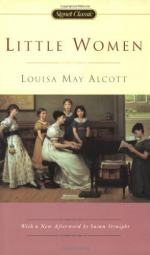She knew her husband’s income, and she loved to feel that he trusted her, not only with his happiness, but what some men seem to value more—his money. She knew where it was, was free to take what she liked, and all he asked was that she should keep account of every penny, pay bills once a month, and remember that she was a poor man’s wife. Till now she had done well, been prudent and exact, kept her little account books neatly, and showed them to him monthly without fear. But that autumn the serpent got into Meg’s paradise, and tempted her like many a modern Eve, not with apples, but with dress. Meg didn’t like to be pitied and made to feel poor. It irritated her, but she was ashamed to confess it, and now and then she tried to console herself by buying something pretty, so that Sallie needn’t think she had to economize. She always felt wicked after it, for the pretty things were seldom necessaries, but then they cost so little, it wasn’t worth worrying about, so the trifles increased unconsciously, and in the shopping excursions she was no longer a passive looker-on.
But the trifles cost more than one would imagine, and when she cast up her accounts at the end of the month the sum total rather scared her. John was busy that month and left the bills to her, the next month he was absent, but the third he had a grand quarterly settling up, and Meg never forgot it. A few days before she had done a dreadful thing, and it weighed upon her conscience. Sallie had been buying silks, and Meg longed for a new one, just a handsome light one for parties, her black silk was so common, and thin things for evening wear were only proper for girls. Aunt March usually gave the sisters a present of twenty-five dollars apiece at New Year’s. That was only a month to wait, and here was a lovely violet silk going at a bargain, and she had the money, if she only dared to take it. John always said what was his was hers, but would he think it right to spend not only the prospective five-and-twenty, but another five-and-twenty out of the household fund? That was the question. Sallie had urged her to do it, had offered to lend the money, and with the best intentions in life had tempted Meg beyond her strength. In an evil moment the shopman held up the lovely, shimmering folds, and said, “A bargain, I assure, you, ma’am.” She answered, “I’ll take it,” and it was cut off and paid for, and Sallie had exulted, and she had laughed as if it were a thing of no consequence, and driven away, feeling as if she had stolen something, and the police were after her.
When she got home, she tried to assuage the pangs of remorse by spreading forth the lovely silk, but it looked less silvery now, didn’t become her, after all, and the words ‘fifty dollars’ seemed stamped like a pattern down each breadth. She put it away, but it haunted her, not delightfully as a new dress should, but dreadfully like the ghost of a folly that was not easily laid. When John




